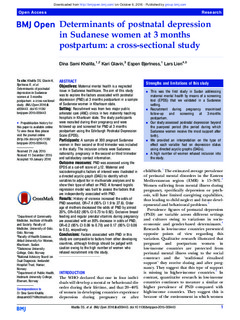| dc.contributor.author | Khalifa, Dina Mohammed Sami | |
| dc.contributor.author | Glavin, Kari | |
| dc.contributor.author | Bjertness, Espen | |
| dc.contributor.author | Lien, Lars | |
| dc.coverage.spatial | Sudan | nb_NO |
| dc.date.accessioned | 2016-10-06T11:00:35Z | |
| dc.date.available | 2016-10-06T11:00:35Z | |
| dc.date.issued | 2016 | |
| dc.identifier.issn | 2044-6055 | |
| dc.identifier.uri | http://hdl.handle.net/11250/2413236 | |
| dc.description.abstract | Objectives: Maternal mental health is a neglected issue in Sudanese healthcare. The aim of this study was to explore the factors associated with postnatal depression (PND) at 3 months postpartum in a sample of Sudanese women in Khartoum state. Setting: Recruitment was from two major public antenatal care (ANC) clinics in two maternity teaching hospitals in Khartoum state. The study participants were recruited during their pregnancy and were followed up and screened for PND at 3 months postpartum using the Edinburgh Postnatal Depression Scale (EPDS). Participants: A sample of 300 pregnant Sudanese women in their second or third trimester was included in the study. The inclusion criteria were Sudanese nationality, pregnancy in the second or third trimester and satisfactory contact information. Outcome measures: PND was assessed using the EPDS at a cut-off score of ≥12. Maternal and sociodemographic factors of interest were illustrated in a directed acyclic graph (DAG) to identify which variables to adjust for in multivariate analyses and to show their type of effect on PND. A forward logistic regression model was built to assess the factors that are independently associated with PND. Results: History of violence increased the odds of PND sevenfold, OR=7.4 (95% CI 1.9 to 27.6). Older age of mothers decreased the odds of PND by almost 20%, OR=0.82 (95% CI 0.73 to 0.92). Exclusive breast feeding and regular prenatal vitamins during pregnancy are associated with an 80% decrease in odds of PND, OR=0.2 (95% CI 0.06 to 0.70) and 0.17 (95% CI 0.06 to 0.5), respectively. Conclusions: Factors associated with PND in this study are comparable to factors from other developing countries, although findings should be judged with caution owing to the high number of women who refused recruitment into the study. | nb_NO |
| dc.language.iso | eng | nb_NO |
| dc.rights | Navngivelse-Ikkekommersiell-IngenBearbeidelse 3.0 Norge | * |
| dc.rights.uri | http://creativecommons.org/licenses/by-nc-nd/3.0/no/ | * |
| dc.title | Determinants of postnatal depression in Sudanese women at 3 months postpartum: a cross-sectional study | nb_NO |
| dc.type | Journal article | nb_NO |
| dc.type | Peer reviewed | nb_NO |

